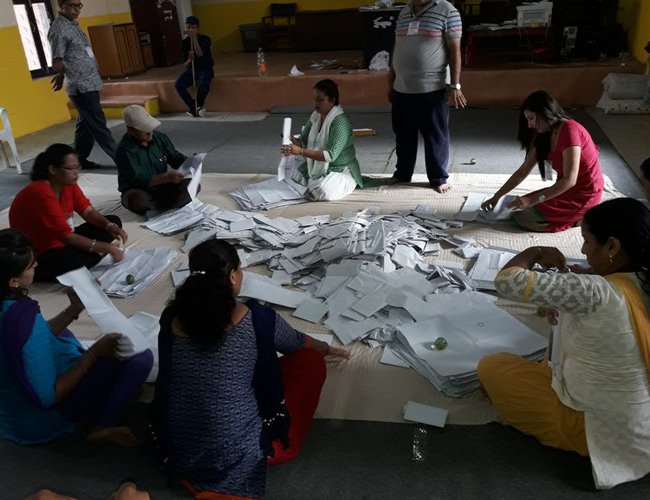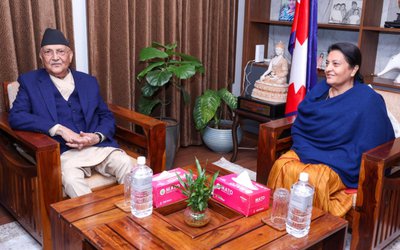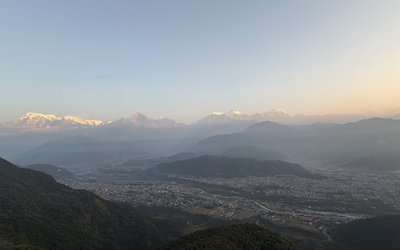
Just a day after the beginning of the counting of vote for the first round of elections on May 15, prime minister Pushpa Kamal Dahal Prachanda disclosed with visiting Madhesh-based leaders of Rashtriya Janta Party Nepal (RJPN) his willingness to step down, paving the way for Nepali Congress leader Sher Bahadur Deuba to become the next prime minister.
The leaders of the newly formed RJPN, who visited prime minister Dahal’s residence to press for the constitution amendment bill, were surprised to listen to such comments from a person, whose continuation in deciding the fate of constitution amendment bill in Legislature Parliament is crucial.
Although there are still a couple of weeks away from the deadline of power sharing agreement, Dahal’s surprised gesture frustrated Madhesh-based parties. “We told prime minister Dahal to continue in the position till the decision on the fate of constitution amendment bill,” Rajendra Mahato told New Spotlight.
NC’s Reaction
Anxiously waiting to lead the government for the fourth time, albeit it is the first time following the declaration of Nepal as Republic, NC leader Deuba and his close associates, who are suspicious about prime minister Dahal’s intention, have felt a sigh of relief.
Dahal’s good gesture is understandable as he wants this alliance to continue for some time to come as his party made a great success in the first round of elections. He argued that Nepali Congress and Maoist Center coalition need to be strong to repeat the success into the second round.
“We are hopeful that prime minister Pushpa Kamal Dahal will step this week,” said MP Narendra Saud, a close associate of Nepali Congress leader Sher Bahadur Deuba.
CPN-UML’s Role
Politics is not a straight game as Prime Minister Dahal and former Prime Minister Deuba believe. Having no favorable gain in the local pools, CPN-UML will make every effort to obstruct the process of smooth transfer of power, obstructing the parliamentary proceeding, which is likely to have impacts on the local elections.
CPN-UML has already announced that they will obstruct the Legislature Parliament. “We continue to obstruct the house proceedings until the withdrawal of the impeachment motion against chief justice Sushila Karki,” said Bhanu Bhakta Jaisi, chief whip of CPN-UML. The meeting of the Legislature Parliament is slated for May 19.
If CPN-UML continues to obstruct the parliamentary meeting, everything will be stalled, including the tabulation of constitution amendment bill, budget, policies of program of government and resignation of Prime Minister Dahal and elections of new prime minister.
Dahal’s Continuation
However, politics is a game of action rather than gesture. As there are items in a long list, including the counting of vote of the first round elections, the fate of the amendment of constitution bill, presentation of budget and government policies and program and issue of impeachment motion, the politics can take turns in favor of Prime Minister Dahal.
Given the short span of time between second round of elections stipulated for June 14 and the period for presenting constitution amendment bill, presenting budget, government policies and programs, there is equal chance for prolonging the life of present government.
According to the Legislature Parliament’s Working Procedure and Constitutional Provisions, it will take at least two weeks for the completion of the process of elections and appointment of new prime minister. As per the constitution, President Bidhya Bhandari has to give at least two weeks for the selection process.
Desperation in Madhesh
As the date is coming closer, there is desperation among the leaders from Madhesh. Madheshi leaders have already made it clear that constitution amendment is the prerequisite for their participation in the second round of elections.
“Besides the amendment of constitution, the registration of our new party, restructuring of current local bodies and issue of compensation to the victims of Madhesh andolan are key demands of our party to take part in the second round of elections,” Rajendra Mahato told New Spotlight.
Indian Stand
According to a news report by Prashanta Jha published on May 16 in The Hindustan Times, India has made ‘shifts’ in its stance, asking Madhesis to drop their demand for change in the constitution.
“India’s advice to drop the demand and contest local elections is shocking," say top Tarai leaders. Indian diplomats in Kathmandu have told Nepal’s Tarai leadership to drop the demand of changes in constitution and participate in the second phase of local elections scheduled next month, a move being seen as a dramatic U-turn on a policy crafted over two years,” writes Jha in his news filed from New Delhi.
“Delhi insists its old policy of broader constitutional accommodation is intact," but top Tarai political leaders, who expressed dismay and shock at what they said was a betrayal, told HT the "advice" came from the "highest levels" of the Indian embassy in Kathmandu. "It was a misreading, a misinterpretation of the message and there was no shift in India’s stand," sources in Delhi said.
“For over a year and a half, India agreed with us on the need for an amendment and the impossibility of accepting elections under this constitutional framework as it exists. But ever since a new ambassador has come in, we are being told to give up the agenda,” a senior leader of the newly unified Madhesi party, the Rashtriya Janata Dal, told HT, according to Jha, indicating new Indian ambassador Manjeev Singh Puri was for the current policy shift. Another Tarai leader said a top embassy official had categorically told him that they should contest elections or face marginalization.
“This will be an admission that that both our line and Indian line of the past two years was wrong. How can we do it? We will have no moral ground left,” the Madheshi leader, who refused to be identified, said. India has maintained the need to bring in amendments to address the demands of all political stakeholders, including Madhesis of the Tarai plains.”
Madheshi in Election
Even two weeks before the report, Upendra Yadav led FSFN took part in the first phase elections aligning with Naya Shakti Party. With the decision of Federal Socialist Forum Nepal (FSFN) led by Upendra Yadav to participate in the polls, RJPN is under pressure to participate in the local poll. However, they cannot move without a face-saving.
RJPN leaders had raised the issue of withdrawal of police cases against their cadres, compensation for those killed or injured and martyrs' status for those killed in the course of the Madhesh agitation.
History of Local Poll
Nepal has almost over 68 years long history of holding the local elction. From the first local elections up to now, communists parties have maintained their influence in the local bodies, particularly in Kathmandu valley. Except in the election of 1992, communist outfits maintained their stronghold in the municipalities and metropolitan Kathmandu. Nepali Congress was able to sweep the national parliamentary elections only in 2008 and 2014 in Kathmandu valley.
Although Kathmandu Valley is traditionally a religious city, communist candidates are the choice of voters. In Bhaktapur, Nepal Peasants and Workers Party, a radical communist party, has been retaining the local and national elections for almost thirty years.
With more than 70 percent votes cast, Nepalese voters have shown that they are matured enough. Having almost six decades long experiences and traditions, Nepalese have learnt the way of casting votes.
“These elections are historic because they have the real potential to reduce political marginalization for the first time in Nepal and to return government to all of its people,” said Dr. George Varughese, the Nepal Country Representative for the Asia Foundation in The Diplomat online.
Despite such a complicated ballot paper with such a big size, the percentage of invalid votes is relatively small. Nepal held the first municipal elections in 1949 under the Rana Regime. Following the first municipal elections, Nepal held the first national elections for parliament in 1959.
Although King Mahendra dismissed parliamentary system in 1960, he continued grass root level democracy. The first direct elections for Village Panchayat and Town Panchayat were held in 1964. The elections continued twice. Constitution of Nepal 1961 gave constitutional status to local bodies. The direct elections process was withheld just between 1975-1979.
After the referendum of 1979, there were local elections held twice, including two national level elections for National Assembly. Following the political change of 1990, two elections were held for local bodies in 1992 and 1997 till the tenure expired in 2002. Despite call for active boycott and threat of physical assaults, forty-five percent people voted in the local poll held in 2005.
Nepal’s recently held local election is a part of continuity in change. From the very early period of making local institutions, Nepal’s development partners have invested heavily on the local bodies including in the electoral education.
Gain and Loss
Looking at the elections trends, Maoist Center has made a big gain in the first round of elections at the cost of CPN-UML. Nepali Congress, which performed badly in the last local elections, has also made progress in the region. However, CPN-UML, which was predicting a sweep in the elections at the cost of two ruling parties, is unable to repeat its past performance.
In the last local elections, CPN-UML grabbed over 80 percent of local bodies. Contrary to its expectations to gain more position in bigger units, CPN-UML did not perform well.
Although the situation favors the second round of elections, the flexibility and role of three parties, Nepali Congress, Maoist Center and CPN-UML, will determine the future. If CPN-UML agrees on the constitution amendment bill, the second round of elections will conclude in a more enthusiastic way than the first phase.



Keshab Poudel
Poudel is the editor of New Spotlight Magazine.
- KUL MAN GHISING: Bowing Down To The People
- Apr 13, 2025
- POLITICAL VIOLENCE: Culture of Impunity
- Apr 11, 2025
- PM OLI MEETS PM MODI: No Progress
- Apr 09, 2025
- PM OLI’S THAILAND VISIT: Flip Flop
- Apr 08, 2025
- FM Dr. Deuba’s India Visit: Mission Aborted
- Mar 26, 2025
















